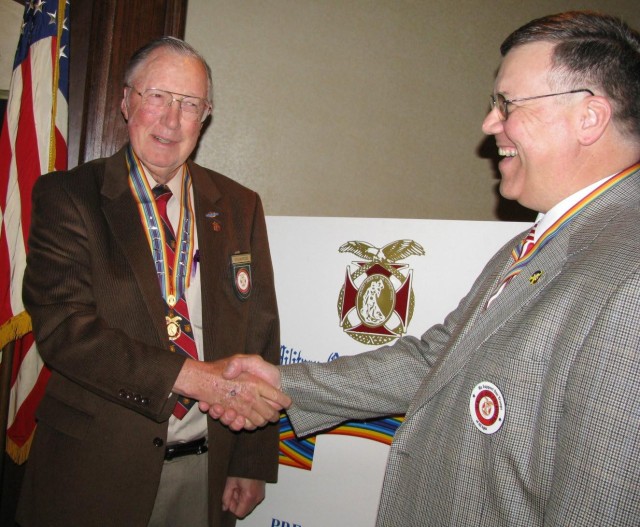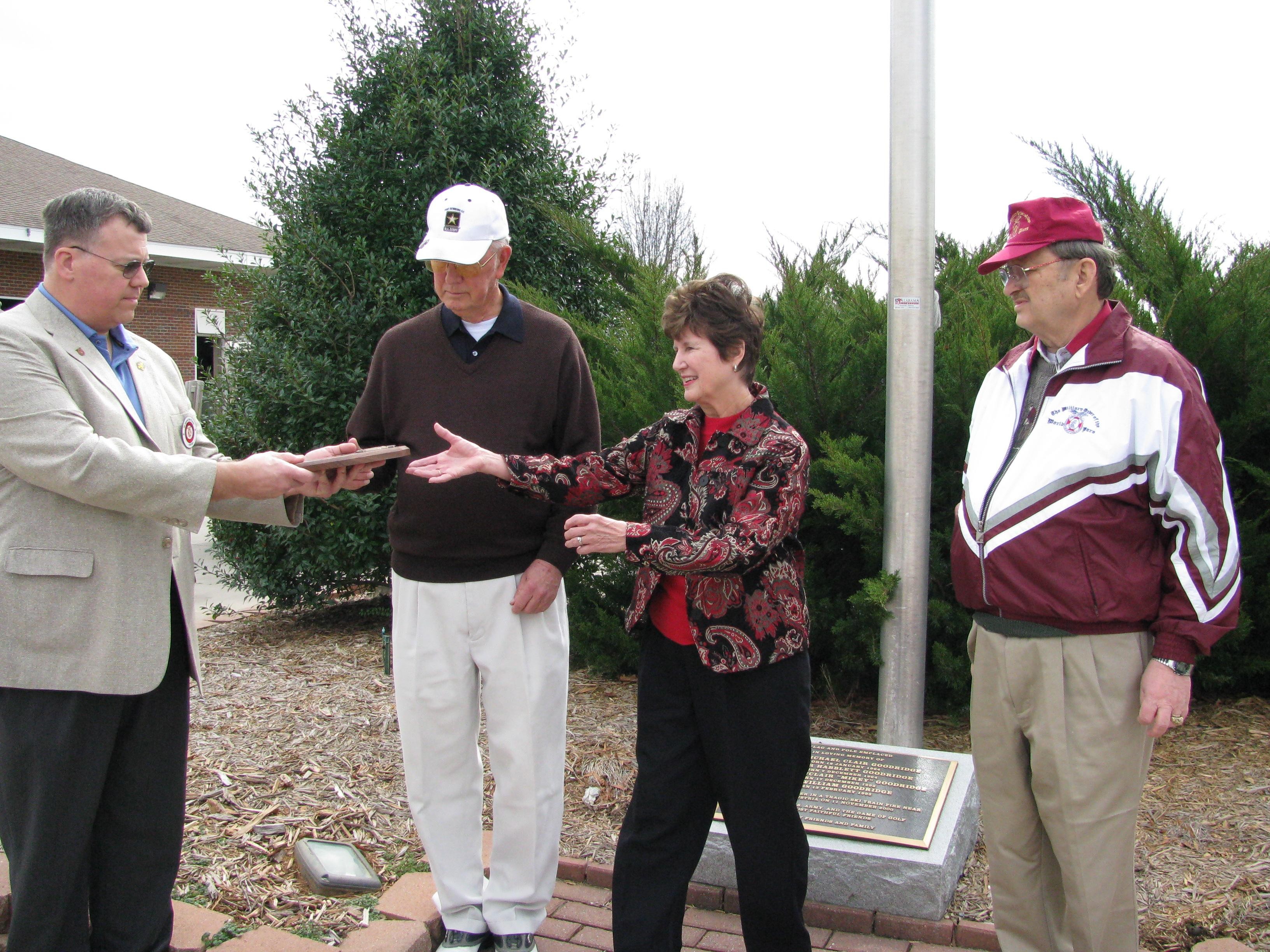Retired Lt. Gen. Robert "Sam" Wetzel carries with him a remembrance of a Purple Heart that was never applied for or awarded.
On the 78-year-old's forehead there is a small scar, a mark left by an enemy bullet that nicked Wetzel as he led his battalion into battle during the Vietnam War.
"Guys were being killed. They had terrible wounds. This was just a little thing," Wetzel said of the scar when asked about it. "I didn't think I deserved a Purple Heart for just a scratch."
Wetzel's 34-year Army career included serving in both the Korean and Vietnam wars, and several assignments leading infantry divisions. Today, this West Point graduate is the commander in chief of the Military Order of the World Wars, a patriotic veterans organization of commissioned officers from all armed services that was established in 1919 and is still committed to promoting national security, patriotism, good citizenship and service to country.
Wetzel was among several MOWW members from across the nation who attended the organization's national 2009 Mid-Winter General Staff Conference hosted by the Huntsville chapter Feb. 10-14 at the Huntsville Space Center Marriott. Huntsville has been one of many stops for Wetzel since he took over as MOWW's commander in chief in August 2008.
"Since then, I've been to Santa Fe, N.M., Tucson and Phoenix, Ariz., Sun City, Fla., Washington, D.C. twice, Baltimore, Md., and to Huntsville for the youth leadership conference," Wetzel said.
"I've also been to College Station, Texas, where we presented former president George H.W. Bush with the Gold Patrick Henry Award and designated him an honorary commander in chief."
Visiting MOWW's 134 chapters nationwide is important to Wetzel, whose personal agenda is very much in line with MOWW's goals.
"When I visit a chapter, I give a speech on national security. I talk about the war on terrorism, the current problems with Iran's nuclear program and the long range worries about China as the country moves toward being the dominate military power by 2030," Wetzel said.
"In each town and city where we have chapters, our members go out and educate the American public, the school children, the clubs like Kiwanis and Rotary, and the media on national security issues. The problem is the American people just don't know what's going on."
Wetzel sees his responsibility to carry the national security message to the public as being even more crucial as the nation changes its priorities under the new administration.
"We have to have a credible military deterrent," he said. "What's happening in the administration today is frightening. The Department of Defense has already been told to take a 10 percent budget cut.
"There are studies being done to cut our force structure and bring everything back to the U.S. and have no influence in the world. If we do that, how will we be able to break or counter the threats of China or Russia or North Korea in the future' We have to increase our end (Soldier) strength of the Army."
Wetzel is proud of MOWW's efforts to instill patriotism and leadership skills in today's youth. The order conducts youth leadership conferences, and works closely with Boy Scouts, Girl Scouts, and JROTC and ROTC programs. Developing the nation's future leaders is one of the order's goals.
"Leaders get results. They set the example. Leaders lead from the front. Leaders inspire people to do what's required of them," Wetzel said. "Everyone has the potential to be a leader."
As a young person, Wetzel didn't know his career path would take him on to be one of the Army's top military leaders. In 1948, he had plans to pursue an engineering degree on scholarship at Purdue University. Instead, an opportunity led him to West Point.
"My father was a lawyer in Clarksburg, W.Va. I used to wait after school in his outer office for a ride home. One day, he came out of his office and asked me 'How'd you like to go to West Point''" Wetzel recalled.
"Our senator had called him and said his candidate had flunked the physical, and he needed to know by the next morning if I wanted to go in his place ... On July 1, 1948, I walked into West Point not knowing what was in store for me."
At West Point, Wetzel became friends with (now retired colonel) Ralph Puckett, who was his squad leader in the east barracks.
"He's told me the reason I made general was because he taught me how to spit shine shoes," Wetzel said with a laugh. "I did the best I could while I was there, and I played on the basketball team."
Wetzel's entire military career was with the Army's infantry, with most of his assignments putting him in the field with Soldiers. Upon graduation from West Point in 1952, he was assigned as the commander of an infantry platoon and infantry company in the Korean War. He was then assigned to command a mechanized infantry company in Germany before being assigned in 1968 as a lieutenant colonel to command the 4th Battalion, 31st Infantry in the Vietnam War. In 1973, as a colonel, Wetzel commanded the 1st Brigade, 4th Infantry Division at Fort Carson, Colo. In 1975, he was promoted to general and sent to Germany, where he commanded the 1st Infantry Division Forward and 3rd Infantry Division. He also served as a member of the Army, Joint and European Command staffs, executive to the Supreme Commander Allied Powers Europe, Gen. Al Haig, in Belgium, and inspector general of U.S. operations in 24 countries for the U.S. European Command.
In 1981, while commander of the Army Infantry School at Fort Benning, Ga., and the Army's chief of infantry, Wetzel was diagnosed with life-ending melanoma cancer. He was given less than a year to live and offered a full medical disability. He refused, recovered from his bout with cancer and, in 1983, was awarded this third star and returned to the troops in Germany. His last assignments were as deputy commander of U.S. Forces Europe and commander of the 5th (V) U.S. Corps.
Wetzel's awards include the Distinguished Service Medal, Bronze Star, two Legion of Merits, six Air Medals, Joint Superior Service Medal, Meritorious Service Medal, the Combat Infantryman's Badge with Star and many others.
His more than eight years of involvement with MOWW has led him to talk to many young people about West Point and about serving in the military.
"No matter what service, the most important thing for a young Soldier is to listen to their drill sergeant. Do what he says. Obey his orders and be the best Soldier you can be," he said.
His advice for troops in combat is similar.
"If you want to go home in a year, listen to your leadership and always keep track of your battle buddy," he said.
Now, as Wetzel serves as the top Soldier for MOWW, he hopes to continue having a positive impact on both the order and the nation's military.
"I hope the order improves, the order increases its membership and the order stays active in educating the public on the threats to our country and increasing the size of the military," he said.




Social Sharing